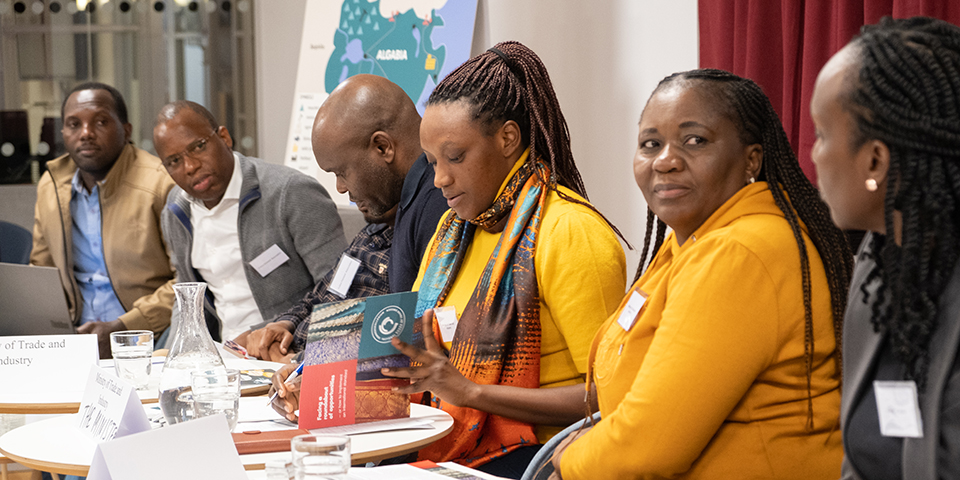Trade Academy Trade Policy

Trade Academy Trade Policy is a free training programme for civil servants in low- and middle income countries. During the one-year programme, you will delve deeper into trade policy issues, both digitally and on site in Stockholm.
The National Board of Trade works to create favourable conditions for low- and middle income countries to participate in international trade and contribute to sustainable development. The Trade Academy Trade Policy programme focuses on capacity development – strengthening civil servants at trade policy institutions in these countries so that they can contribute to institutional change. The aim is for training participants to use trade policy analysis methods and thus contribute to sustainable development.
Next course in 2026
In 2025, the National Board of Trade will work on updates to launch a revised Trade Academy Trade Policy course in 2026. Hence, the programme will not run in 2025.
Who can participate in the programme?
Trade Academy Trade Policy is primarily intended for civil servants in a low- and middle income country. Each year, the National Board of Trade invites countries to participate in the programme. To participate, you need to work with trade issues on a daily basis, for example in a ministry. You should be involved in shaping your country's trade policy, but want to deepen your knowledge and analytical skills. Each participant is selected by the National Board of Trade. To qualify, your employer needs to authorise your participation, as you will be away from your work for some time.
An interactive training programme in hybrid format
The programme contains a mix of several different teaching methods and activities: e-learning, assignment work at home, and classroom training in Stockholm. The digital lessons consist of text content, videos and quizzes, which you work through at your own pace. At the physical meetings, you work in groups with other civil servants from different low- and middle income countries, discussing and working on cases. One of the most popular aspects of Trade Academy is the opportunity to exchange experiences with other participants.
Trade Academy Trade Policy
Programme duration: 1 year
Study format: Hybrid (distance learning/Stockholm)
Suitable for: Civil servants
Language: English
Price: Free of charge
Course focus and content
The programme reflects trade from a civil servant perspective and provides a holistic view of trade policy. It highlights how different issues are interrelated and how trade policy affects and is affected by other policy areas. The sustainability perspective permeates the entire programme, as a well-designed trade policy can contribute to greater sustainability, whether ecological, social or economic.
The following topics are analysed and discussed:
- Trade reality
How trade is conducted today, drivers of trade, links between trade and sustainable development. - Trade policy
Trade barriers, trade policy architecture and trade agreements at the multilateral, regional and bilateral level. - Trade regulations
Trade regulations both at and behind the border, their rationale, how they are used and how they affect trade. - Identification of trade interests
How policies, regulations, processes, and stakeholders work together to conduct trade policy. - Trade policy implementation
How to implement trade obligations and regulations, and how to manage trade barriers.
A five-phase programme
During the one-year programme, you will go through five phases together with the other participants:
Phase 1 (digital, approx. 1.5 months) – Trade and trade policy
Individual e-learning on trade and trade policy. The aim is to provide a good foundation for the rest of the programme. Estimated working time about 20 hours.
Phase 2 (on site/Stockholm, about 2 weeks) – Methods and tools for trade policy analysis
We work together on site in Stockholm with methods for trade policy analysis. We work through exercises in problem analysis, stakeholder analysis and sustainability analysis. We initiate the work with a trade policy impact assessment (see Phase 3).
Phase 3 (assignment work at home, approx. 4 months) – trade policy impact assessment
Independent work on an impact assessment, where you and your group will propose a measure to solve the problem you have identified. The work is done remotely in groups, with digital support from a mentor.
Phase 4 (on site/Stockholm, approx. 1 week) – Change management and implementation
Work on site in Stockholm, focusing on change management and implementing trade policy in practice. Presentations and discussions on assignment work at home/impact assessments. We practise drawing up action plans based on the impact assessments.
Phase 5 – Alumni
Once you have completed the programme, you will be invited to join the Trade Academy's alumni network on LinkedIn, where you and other participants can stay connected and share knowledge on trade-related issues.
From a participant's perspective
Read the interviews with three of the participants of the Trade Academy programme:
The National Board of Trade also organises Trade Academy Trade Promotion for professionals working to promote trade.
Welcome to contact Trade Academy
Would you like more information about Trade Academy – or are you or someone in your organisation interested in participating? If so, please contact us.
Trade Academy
E-mail: tradeacademy@kommerskollegium.se
